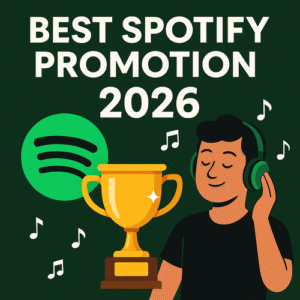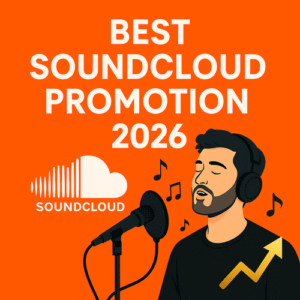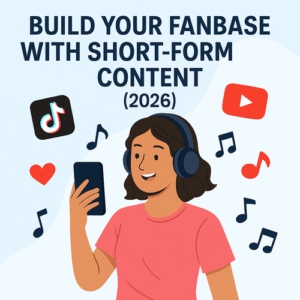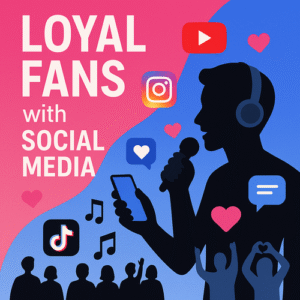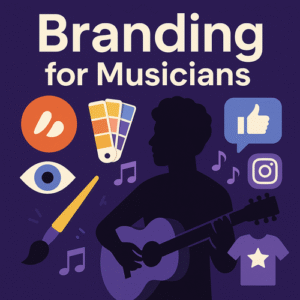For independent musicians in 2025, crowdfunding is not just a buzzword—it’s one of the most powerful ways to finance new music, albums, tours, and creative projects. Instead of relying on record labels or going into debt, more artists are harnessing the power of their fanbase to bring their musical vision to life. But successful crowdfunding is more than just putting up a donation page and hoping for the best. It’s about community, planning, and executing a strategy that motivates fans to support your music journey. In this guide, you’ll discover everything you need to know about crowdfunding for independent musicians—why it works, which platforms to use, how to build a winning campaign, and the keys to lasting success.
Why Crowdfunding Matters for Independent Musicians
Crowdfunding lets musicians raise funds directly from their audience, turning fans into stakeholders in their creative process. In an era where streaming payouts are low and record deals are rare, crowdfunding puts the power back into the artist’s hands. Instead of waiting for a label’s approval, you can take action, fund your project, and retain full control over your music. Even more important: crowdfunding builds a stronger bond with your listeners, transforming casual fans into true supporters who want to see you succeed.
The Main Crowdfunding Models Explained
There are several models of crowdfunding that independent musicians can use, each with its own strengths and challenges. The two most common are:
Rewards-Based Crowdfunding
This is the most popular type for musicians. Fans pledge money and receive rewards in return—such as digital downloads, signed CDs, exclusive merch, VIP tickets, or even personal experiences like a private concert.
Platforms: Kickstarter, Indiegogo, GoFundMe
Patronage or Subscription Crowdfunding
Fans support you with recurring payments, usually monthly, in exchange for ongoing exclusive content and perks.
Platforms: Patreon, Bandcamp (subscriptions), Ko-fi
Top Crowdfunding Platforms for Musicians
With so many crowdfunding sites available, it’s important to pick one that fits your goals and music style. Here’s an overview of the most popular options:
Kickstarter
Kickstarter is perhaps the best-known platform for creative projects. It’s all-or-nothing: you set a funding goal, and only get the money if your campaign is 100% funded. This can motivate fans to help push you over the finish line, but also means you need to plan carefully. Musicians have raised millions for albums, vinyl, tours, and even music videos here.
Indiegogo
Indiegogo is similar to Kickstarter but more flexible. You can choose between all-or-nothing or “keep what you raise” models. This is ideal if you want to ensure you get some funding, even if you don’t hit your full goal. Indiegogo is widely used for album launches, tour support, and music tech projects.
Patreon
Patreon is a subscription-based platform where fans (“patrons”) support you with monthly payments. In exchange, you provide regular exclusive content—behind-the-scenes videos, early access to new music, livestreams, or private community chats. Patreon is perfect for artists who want ongoing support rather than one-off campaigns.
Bandcamp
Bandcamp now allows artists to offer fan subscriptions, giving supporters regular music drops, special access, and more. Bandcamp is already a music discovery platform, so building your crowdfunding there connects support directly to your releases.
GoFundMe
GoFundMe is a donation-based platform often used for personal and urgent needs, like emergency funding or community projects. Musicians sometimes use it for sudden expenses (medical bills, gear replacement) or charity singles.
Other Niche Platforms
Depending on your genre, you might consider platforms like PledgeMusic (if revived), Ko-fi, or country-specific platforms that cater to music and the arts. Always check platform fees, payout times, and support for music projects.
Planning a Successful Crowdfunding Campaign
Launching a crowdfunding campaign as an independent musician takes more than uploading your project and hoping for the best. The most successful campaigns follow a carefully crafted plan, focusing on storytelling, community, and trust.
Define Your Goal
Be specific and transparent. Are you funding an album, a music video, tour expenses, or something else? Fans are more likely to support clear, well-defined goals. Break down your costs and explain exactly how the money will be used.
Example: “We need €5,000 to record, mix, master, and press 500 vinyl copies of our debut album.”
Build Your Audience Before You Launch
Crowdfunding works best if you already have a fanbase—no matter how small. Start by building an email list, engaging with followers on social media, and sharing behind-the-scenes content. Let your audience know that something special is coming.
Use teaser posts, countdowns, and email sneak peeks to generate excitement before launch day.
Craft a Compelling Story
People support artists, not just products. Tell your story authentically: why is this project important? What challenges have you overcome? Why should fans help make this happen now? Use video to make a personal appeal—crowdfunding campaigns with video are much more likely to succeed.
Share your passion, dreams, and what their support will mean for your journey.
Offer Irresistible Rewards
Your rewards are your campaign’s backbone. Think creatively about what your fans value:
- Digital downloads of the finished project
- Signed CDs, vinyl, cassettes, or unique formats
- Exclusive merch (shirts, posters, lyric books)
- Early access or “first listen” to new music
- VIP tickets to release shows or private Zoom concerts
- Song dedications or personal thank you messages
- Experiences (studio visits, songwriting workshops, meet-and-greets)
- Executive producer credits or custom covers
Make sure each reward is clearly described, realistically deliverable, and priced appropriately. Limited-edition or exclusive rewards add extra motivation for fans to pledge early.
Set a Realistic Timeline
Be honest about how long your project will take and when fans will receive their rewards. Regular updates are key—if there are delays, keep your supporters informed. Transparency builds trust and keeps backers invested in your journey.
Create a Launch Strategy
Don’t just hit “publish” and hope for the best. Plan your launch for a time when your audience is active—avoid holidays or busy periods. Prepare posts for all your social channels, email your list, and ask friends, collaborators, and influencers to help spread the word.
Promote Relentlessly (But Authentically)
Promoting a crowdfunding campaign is hard work, but authenticity makes all the difference. Share updates, behind-the-scenes moments, and progress on your campaign. Thank supporters publicly and keep the excitement alive.
Consider livestreams, Q&A sessions, and “stretch goal” reveals if you hit your initial target.
Engage and Respond
Crowdfunding is a two-way conversation. Reply to messages, thank your backers personally, and ask for feedback. Involve your supporters in the creative process by sharing demos, voting on merch designs, or posting progress updates.
Keep Your Word
Deliver rewards as promised and update supporters if there are any changes. A fulfilled campaign builds trust for your next project and turns one-time backers into lifelong fans.
Crowdfunding Campaign Mistakes to Avoid
While many musicians have launched successful crowdfunding campaigns, others fall short due to avoidable mistakes. Here’s what to watch out for:
Setting Unrealistic Goals
Don’t ask for too much (or too little). Unrealistic budgets can scare off potential backers or leave you struggling to fulfill promises.
Neglecting Promotion
A “set it and forget it” approach doesn’t work. Crowdfunding requires daily promotion, updates, and engagement.
Overpromising Rewards
Make sure you can deliver every reward. Complicated or expensive perks can eat into your budget and delay delivery.
Ignoring Your Community
Crowdfunding is about connection. If you treat it as just a money grab, you’ll lose support quickly.
Lack of Transparency
Keep supporters informed every step of the way. Unexpected problems are OK—silence is not.
Real Success Stories: Independent Musicians Who Crowdfunded Their Dreams
Countless independent musicians have used crowdfunding to bring their music to life. Here are a few inspiring examples:
Amanda Palmer
In 2012, Amanda Palmer famously raised over $1.2 million on Kickstarter to fund her album and art book, shattering expectations and changing how the industry viewed direct artist support. She credited much of her success to a highly engaged fanbase, transparency, and personal connection.
De Staat (Netherlands)
Dutch rock band De Staat turned to crowdfunding to finance their ambitious live DVD and album, offering unique rewards like exclusive rehearsals and signed memorabilia. Their campaign succeeded because it gave fans a chance to be part of something special and celebrated the band’s community spirit.
Home Free
A cappella group Home Free used Patreon to create a sustainable income, offering patrons regular exclusive videos, live chats, and voting power over new projects. They built a community of superfans who support their music month after month.
Jordy Searcy
Singer-songwriter Jordy Searcy launched a Kickstarter campaign to fund a new album, combining behind-the-scenes vlogs, personal updates, and creative rewards. His authenticity and transparency helped him exceed his funding goal and grow his audience in the process.
These stories show that with passion, planning, and real connection, independent artists can succeed on their own terms.
Boost Your Music with Daimoon.media
Daimoon.media is a leading music marketing agency based in Rotterdam, helping both emerging and established artists grow their presence on Spotify, YouTube, and SoundCloud. With a proven track record—over 10,000 artists served, 15 million YouTube views, and millions of playlist listeners—Daimoon.media delivers safe, organic, and fully tailored promotion campaigns for every genre.
Comparing Crowdfunding to Traditional Funding Options
Crowdfunding isn’t the only way to fund your music, but for many indie artists, it offers clear advantages:
Control: You keep ownership of your music and creative process.
Community: Fans feel personally invested in your journey.
Flexibility: Campaigns can be big (full albums) or small (single music videos).
No Debt: You’re not taking out loans or giving away future royalties.
However, it’s not easy money. Crowdfunding demands hard work, organization, and constant communication. But for artists who value independence, it’s one of the best ways to launch new music in 2025.
How to Build Long-Term Success After Crowdfunding
A great crowdfunding campaign isn’t just about raising money—it’s about building lasting relationships with your fans. Here’s how to leverage your success for long-term growth:
Turn Backers into Superfans
Reward your supporters with exclusive content, first listens, and ongoing updates—even after the campaign ends.
Invite them into your creative process and show them the impact of their support.
Keep Communicating
Don’t let your email list go cold. Share new music, stories, and opportunities to stay involved.
Thank your supporters regularly and celebrate milestones together.
Document Your Journey
Capture behind-the-scenes moments, project milestones, and fan stories. Share your journey on social media and in press coverage. This keeps the buzz alive and attracts new fans for future campaigns.
Plan Your Next Move
Think of crowdfunding as a step in your career, not a one-off event. Use the experience, feedback, and new fans to launch new releases, tours, or merchandise.
Crowdfunding FAQ for Independent Musicians
Kickstarter and Indiegogo are ideal for one-off projects like albums and tours. Patreon is best for ongoing support and monthly content. Choose the platform that fits your project and fan engagement style.
Campaigns can range from a few hundred to tens of thousands of dollars. Success depends on your audience size, project scope, and how well you promote your campaign.
No. Crowdfunding lets you keep full ownership and control. Fans support you in exchange for rewards—not for a share of your copyright.
On Kickstarter, you get nothing unless you reach your funding goal. On Indiegogo and others, you may keep what you raise. Be clear about your campaign type before you start.
No! Many successful campaigns come from indie artists with small but passionate fanbases. The key is authenticity and real engagement—not numbers alone.
Be honest about your timeline, communicate regularly, and don’t overpromise on rewards. If delays happen, update your backers promptly.
Only if you ignore your backers or fail to deliver. Transparency, communication, and follow-through ensure your reputation grows stronger.
Most indie artists manage their own campaigns, but if you have a big goal or feel overwhelmed, consultants can help with planning, promotion, and execution.
Conclusion: Crowdfunding Empowers the Next Generation of Independent Musicians
Crowdfunding for independent musicians is more than a way to raise money—it’s a movement that empowers artists to connect directly with fans, build creative freedom, and launch music projects on their own terms. By understanding the platforms, crafting a compelling campaign, and nurturing your community, you can unlock the full potential of crowdfunding in 2025 and beyond. Start planning, connect with your audience, and make your next release a reality—one fan at a time.
